英语情态动词用法总结(完整)
- 格式:doc
- 大小:71.50 KB
- 文档页数:10
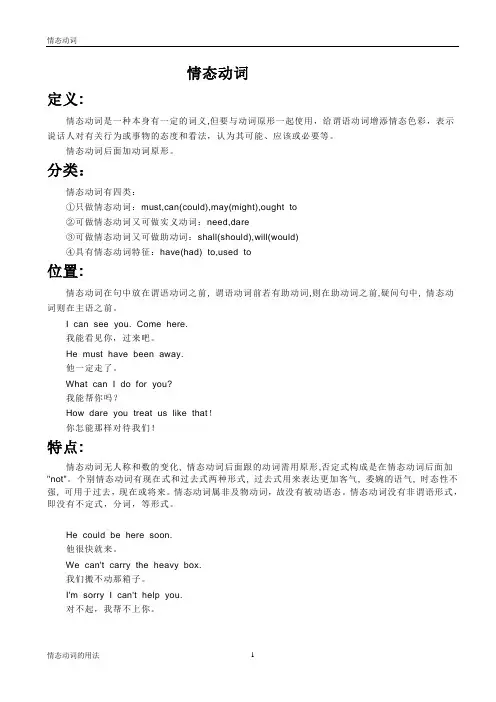
情态动词定义:情态动词是一种本身有一定的词义,但要与动词原形一起使用,给谓语动词增添情态色彩,表示说话人对有关行为或事物的态度和看法,认为其可能、应该或必要等。
情态动词后面加动词原形。
分类:情态动词有四类:①只做情态动词:must,can(could),may(might),ought to②可做情态动词又可做实义动词:need,dare③可做情态动词又可做助动词:shall(should),will(would)④具有情态动词特征:have(had) to,used to位置:情态动词在句中放在谓语动词之前, 谓语动词前若有助动词,则在助动词之前,疑问句中, 情态动词则在主语之前。
I can see you. Come here.我能看见你,过来吧。
He must have been away.他一定走了。
What can I do for you?我能帮你吗?How dare you treat us like that!你怎能那样对待我们!特点:情态动词无人称和数的变化, 情态动词后面跟的动词需用原形,否定式构成是在情态动词后面加"not"。
个别情态动词有现在式和过去式两种形式, 过去式用来表达更加客气, 委婉的语气, 时态性不强, 可用于过去,现在或将来。
情态动词属非及物动词,故没有被动语态。
情态动词没有非谓语形式,即没有不定式,分词,等形式。
He could be here soon.他很快就来。
We can't carry the heavy box.我们搬不动那箱子。
I'm sorry I can't help you.对不起,我帮不上你。
基本助动词与情态助动词最主要的区别之一是,基本助动词本身没有词义,而情态助动词则有自己的词义,能表示说话人对有关动作或状态的看法,或表示主观设想:What have you been doing since? (构成完成进行体,本身无词义)I am afraid I must be going. (一定要)You may have read some account of the matter. (或许已经)除此之外,情态助动词还有如下词法和句法特征:1)除ought和used以外,其他情态动词后面只能接不带to的不定式。
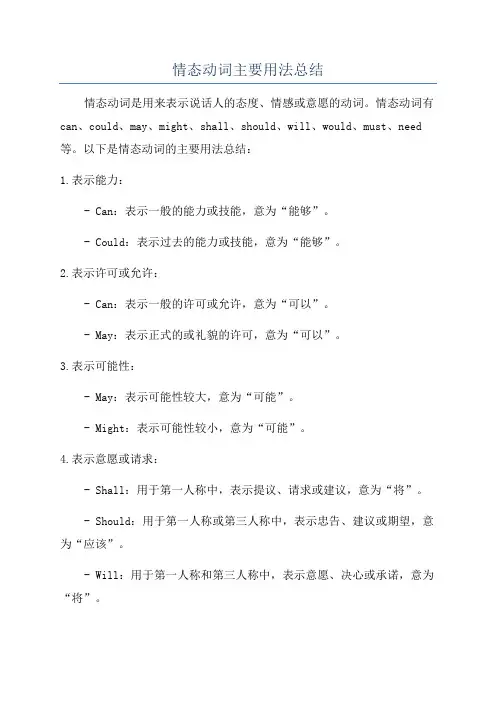
情态动词主要用法总结情态动词是用来表示说话人的态度、情感或意愿的动词。
情态动词有can、could、may、might、shall、should、will、would、must、need 等。
以下是情态动词的主要用法总结:1.表示能力:- Can:表示一般的能力或技能,意为“能够”。
- Could:表示过去的能力或技能,意为“能够”。
2.表示许可或允许:- Can:表示一般的许可或允许,意为“可以”。
- May:表示正式的或礼貌的许可,意为“可以”。
3.表示可能性:- May:表示可能性较大,意为“可能”。
- Might:表示可能性较小,意为“可能”。
4.表示意愿或请求:- Shall:用于第一人称中,表示提议、请求或建议,意为“将”。
- Should:用于第一人称或第三人称中,表示忠告、建议或期望,意为“应该”。
- Will:用于第一人称和第三人称中,表示意愿、决心或承诺,意为“将”。
- Would:用于第一人称和第三人称中,表示客气的请求、建议或愿望,意为“将”。
5.表示必要性或推测:- Must:表示必须性或应该性,意为“必须”。
- Should:表示推测、猜测或可能性较大的必要性,意为“应该”。
6.表示时间或条件:- Will/Would:表示未来时间或条件,意为“将/将会”。
7.表示推测或假设:- Must:表示肯定的推测,意为“一定”。
- May/Might:表示可能的推测,意为“可能”。
需要注意的是,情态动词本身没有人称和数的变化,后面的动词应为原形。
另外,他们常常与动词的原形连用构成谓语,可以用于各种句型,例如肯定句、否定句、疑问句等。
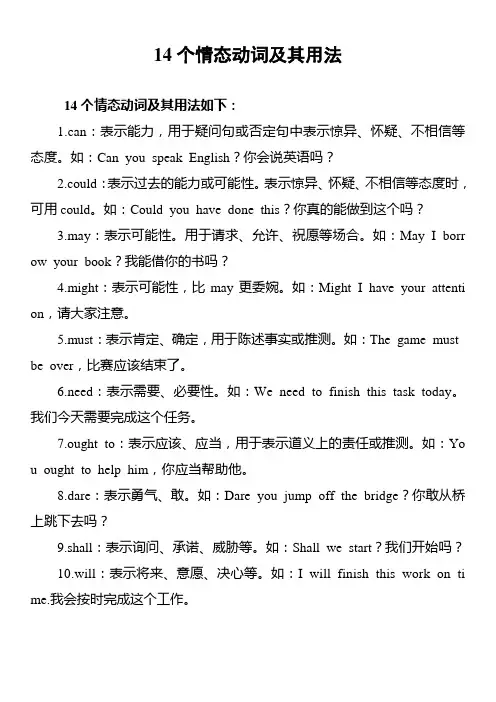
14个情态动词及其用法14个情态动词及其用法如下:1.can:表示能力,用于疑问句或否定句中表示惊异、怀疑、不相信等态度。
如:Can you speak English?你会说英语吗?2.could:表示过去的能力或可能性。
表示惊异、怀疑、不相信等态度时,可用could。
如:Could you have done this?你真的能做到这个吗?3.may:表示可能性。
用于请求、允许、祝愿等场合。
如:May I borr ow your book?我能借你的书吗?4.might:表示可能性,比may更委婉。
如:Might I have your attenti on,请大家注意。
5.must:表示肯定、确定,用于陈述事实或推测。
如:The game must be over,比赛应该结束了。
6.need:表示需要、必要性。
如:We need to finish this task today。
我们今天需要完成这个任务。
7.ought to:表示应该、应当,用于表示道义上的责任或推测。
如:Yo u ought to help him,你应当帮助他。
8.dare:表示勇气、敢。
如:Dare you jump off the bridge?你敢从桥上跳下去吗?9.shall:表示询问、承诺、威胁等。
如:Shall we start?我们开始吗?10.will:表示将来、意愿、决心等。
如:I will finish this work on ti me.我会按时完成这个工作。
11.had better:表示建议、警告。
如:You had better hurry,你最好快点。
12.have to:表示被迫、必须。
如:I have to go to work,我必须去上班。
ed to:表示过去经常发生的动作或状态,也可表示习惯或倾向。
如:He used to smoke,他过去经常抽烟。
14.shouldn't:表示不应该,用于否定句中表示建议、批评等。
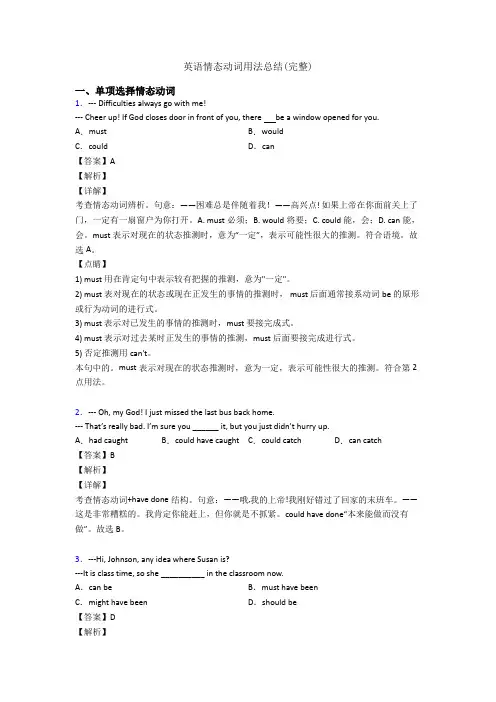
英语情态动词用法总结(完整)一、单项选择情态动词1.--- Difficulties always go with me!--- Cheer up! If God closes door in front of you, there be a window opened for you. A.must B.wouldC.could D.can【答案】A【解析】【详解】考查情态动词辨析。
句意:——困难总是伴随着我!——高兴点! 如果上帝在你面前关上了门,一定有一扇窗户为你打开。
A. must必须;B. would将要;C. could能,会;D. can能,会。
must表示对现在的状态推测时,意为“一定”,表示可能性很大的推测。
符合语境。
故选A。
【点睛】1) must用在肯定句中表示较有把握的推测,意为"一定"。
2) must表对现在的状态或现在正发生的事情的推测时, must 后面通常接系动词be 的原形或行为动词的进行式。
3) must 表示对已发生的事情的推测时,must 要接完成式。
4) must表示对过去某时正发生的事情的推测,must 后面要接完成进行式。
5) 否定推测用can't。
本句中的。
must表示对现在的状态推测时,意为一定,表示可能性很大的推测。
符合第2点用法。
2.--- Oh, my God! I just missed the last bus back home.--- That’s really bad. I’m sure you ______ it, but you just didn’t hurry up.A.had caught B.could have caught C.could catch D.can catch【答案】B【解析】【详解】考查情态动词+have done结构。
句意:——哦,我的上帝!我刚好错过了回家的末班车。
——这是非常糟糕的。
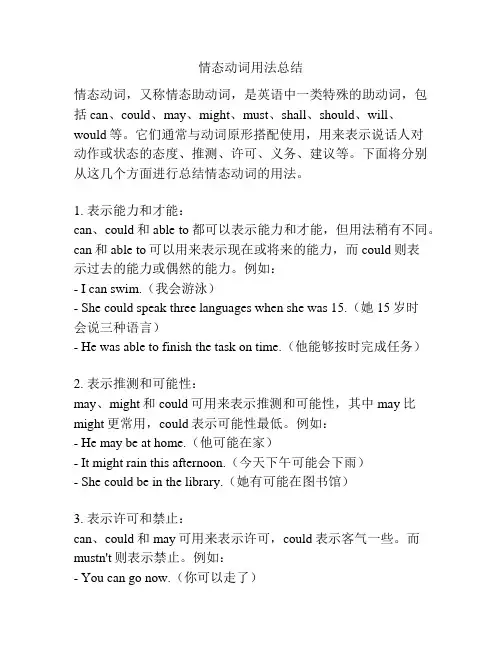
情态动词用法总结情态动词,又称情态助动词,是英语中一类特殊的助动词,包括can、could、may、might、must、shall、should、will、would等。
它们通常与动词原形搭配使用,用来表示说话人对动作或状态的态度、推测、许可、义务、建议等。
下面将分别从这几个方面进行总结情态动词的用法。
1. 表示能力和才能:can、could和able to都可以表示能力和才能,但用法稍有不同。
can和able to可以用来表示现在或将来的能力,而could则表示过去的能力或偶然的能力。
例如:- I can swim.(我会游泳)- She could speak three languages when she was 15.(她15岁时会说三种语言)- He was able to finish the task on time.(他能够按时完成任务)2. 表示推测和可能性:may、might和could可用来表示推测和可能性,其中may比might更常用,could表示可能性最低。
例如:- He may be at home.(他可能在家)- It might rain this afternoon.(今天下午可能会下雨)- She could be in the library.(她有可能在图书馆)3. 表示许可和禁止:can、could和may可用来表示许可,could表示客气一些。
而mustn't则表示禁止。
例如:- You can go now.(你可以走了)- Could I use your computer?(我能用一下你的电脑吗?)- You mustn't smoke here.(你不能在这里抽烟)4. 表示义务和必要性:must表示主观上的义务和必要性,常用来表示说话人的主观判断。
have to则表示客观上的必要性和强制性。
例如:- I must finish my homework tonight.(我必须今晚完成作业)- I have to get up early tomorrow.(我明天必须早起)5. 表示建议和推荐:should和ought to都表示建议或推荐,should更常用一些,ought to用得相对较少。
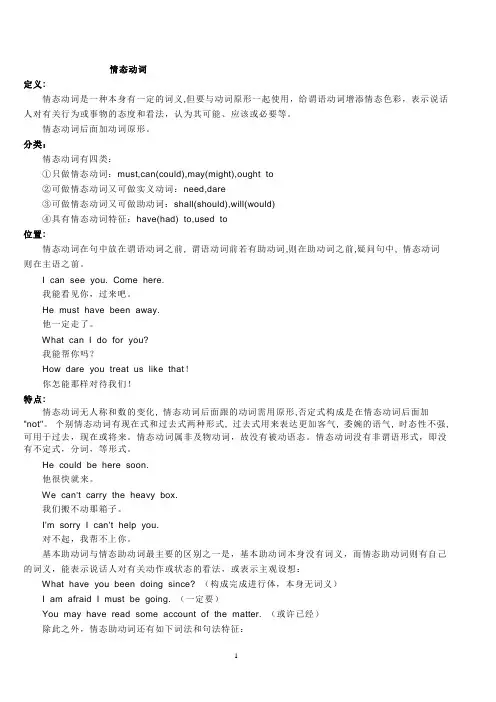
情态动词定义:情态动词是一种本身有一定的词义,但要与动词原形一起使用,给谓语动词增添情态色彩,表示说话人对有关行为或事物的态度和看法,认为其可能、应该或必要等。
情态动词后面加动词原形。
分类:情态动词有四类:①只做情态动词:must,can(could),may(might),ought to②可做情态动词又可做实义动词:need,dare③可做情态动词又可做助动词:shall(should),will(would)④具有情态动词特征:have(had) to,used to位置:情态动词在句中放在谓语动词之前, 谓语动词前若有助动词,则在助动词之前,疑问句中, 情态动词则在主语之前。
I can see you. Come here.我能看见你,过来吧。
He must have been away.他一定走了。
What can I do for you?我能帮你吗?How dare you treat us like that!你怎能那样对待我们!特点:情态动词无人称和数的变化, 情态动词后面跟的动词需用原形,否定式构成是在情态动词后面加"not"。
个别情态动词有现在式和过去式两种形式, 过去式用来表达更加客气, 委婉的语气, 时态性不强, 可用于过去,现在或将来。
情态动词属非及物动词,故没有被动语态。
情态动词没有非谓语形式,即没有不定式,分词,等形式。
He could be here soon.他很快就来。
We can't carry the heavy box.我们搬不动那箱子。
I'm sorry I can't help you.对不起,我帮不上你。
基本助动词与情态助动词最主要的区别之一是,基本助动词本身没有词义,而情态助动词则有自己的词义,能表示说话人对有关动作或状态的看法,或表示主观设想:What have you been doing since? (构成完成进行体,本身无词义)I am afraid I must be going. (一定要)You may have read some account of the matter. (或许已经)除此之外,情态助动词还有如下词法和句法特征:1)除ought和used以外,其他情态动词后面只能接不带to的不定式。
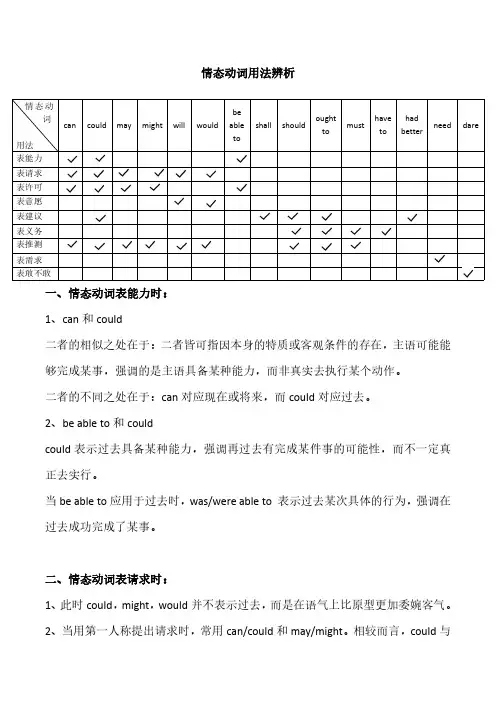
情态动词用法辨析情态动词用法can could may might will would be able to shall should ought to must have to had better need dare表能力表请求表许可表意愿表建议表义务表推测表需求表敢不敢一、情态动词表能力时:1、can 和could二者的相似之处在于:二者皆可指因本身的特质或客观条件的存在,主语可能能够完成某事,强调的是主语具备某种能力,而非真实去执行某个动作。
二者的不同之处在于:can 对应现在或将来,而could 对应过去。
2、be able to 和couldcould 表示过去具备某种能力,强调再过去有完成某件事的可能性,而不一定真正去实行。
当be able to 应用于过去时,was/were able to 表示过去某次具体的行为,强调在过去成功完成了某事。
二、情态动词表请求时:1、此时could ,might ,would 并不表示过去,而是在语气上比原型更加委婉客气。
2、当用第一人称提出请求时,常用can/could 和may/might 。
相较而言,could 与may在表请求的问句中出现的频率最高;might表发请求的语气最为委婉客气,因此反而很少见;而can则常用于熟人间的对话中。
语气强度:can>could/might>might3、当用第二人称提出请求时,常用can/could和will/would。
其中could和would 表达请求的语气更委婉客气;而can与will则常用于熟人对话中。
语气强度:can/will>could/would三、情态动词表许可时:1、与表请求不同,will/would不论前接第几人称,都表示主语本身的意愿,无需得到他人的“许可”,所以will/would不可以用于表请求的句中。
2、can和may二者都可以表示对现在或将来动作的许可,其中can的使用频率更高。
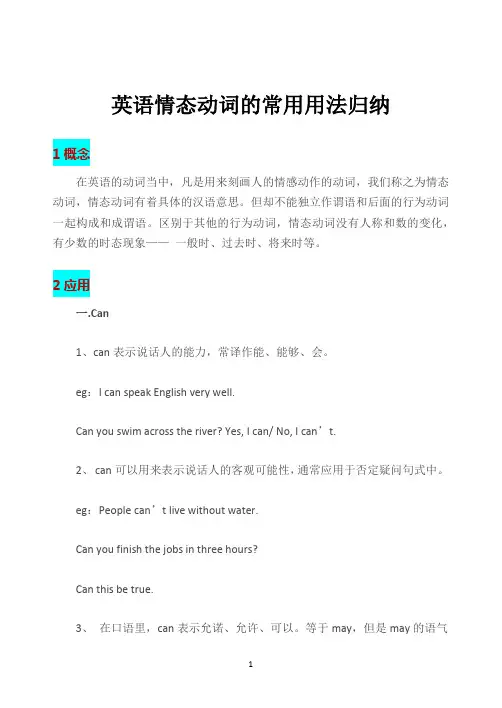
英语情态动词的常用用法归纳1概念在英语的动词当中,凡是用来刻画人的情感动作的动词,我们称之为情态动词,情态动词有着具体的汉语意思。
但却不能独立作谓语和后面的行为动词一起构成和成谓语。
区别于其他的行为动词,情态动词没有人称和数的变化,有少数的时态现象——一般时、过去时、将来时等。
2应用一.Can1、can表示说话人的能力,常译作能、能够、会。
eg:I can speak English very well.Can you swim across the river? Yes, I can/ No, I can’t.2、can可以用来表示说话人的客观可能性,通常应用于否定疑问句式中。
eg:People can’t live without water.Can you finish the jobs in three hours?Can this be true.3、在口语里,can表示允诺、允许、可以。
等于may,但是may的语气重于can。
eg:Can I come in? = May I come in?Can I use your bike? = May I use your bike ?*表示允许可以may mightcould can4、在“过去时”的语境里,通常用could 表示它的过去式,用be able to 短语(was/were)而could通常用来在一般现在时的语境里表示委婉语气eg:Could(can)you show me the way to the supermarket?5、can表示猜测(1)对现在状态的一种猜测,只能用在否定疑问句中。
eg:Zhang can’t be ill really?This can’t be done by him.(2)对现在动作的猜测eg: The boy can’t be telling lies.Mary works so hard, now, she can’t be sleeping.(3)对过去动作的一种猜测eg:He can’t have gone to the bookshop yesterday.Mother couldn’t have said it.6、can(could)惯用法(1)can’t wait to do 迫不及待做…….eg: Children can’t wait to eat apples in the basket.(2)can’t help doing 情不自禁做某事。
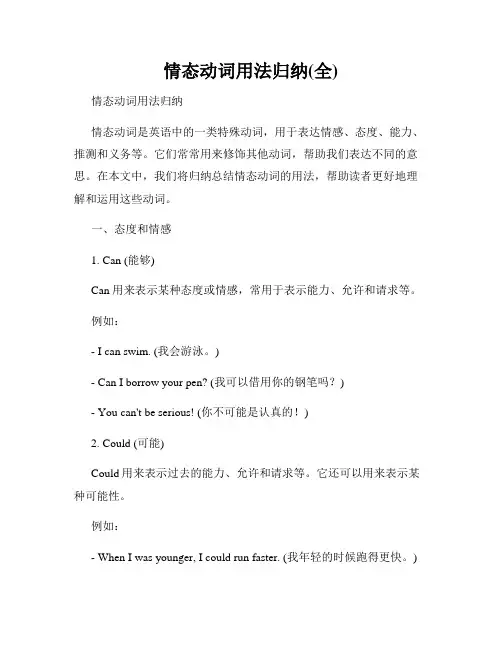
情态动词用法归纳(全)情态动词用法归纳情态动词是英语中的一类特殊动词,用于表达情感、态度、能力、推测和义务等。
它们常常用来修饰其他动词,帮助我们表达不同的意思。
在本文中,我们将归纳总结情态动词的用法,帮助读者更好地理解和运用这些动词。
一、态度和情感1. Can (能够)Can用来表示某种态度或情感,常用于表示能力、允许和请求等。
例如:- I can swim. (我会游泳。
)- Can I borrow your pen? (我可以借用你的钢笔吗?)- You can't be serious! (你不可能是认真的!)2. Could (可能)Could用来表示过去的能力、允许和请求等。
它还可以用来表示某种可能性。
例如:- When I was younger, I could run faster. (我年轻的时候跑得更快。
)- Could I ask you a question? (我可以问你一个问题吗?)- It could rain later, so bring an umbrella. (今天后面可能会下雨,所以带上雨伞。
)3. May (可能)May常表示许可、请求和推测等。
它还可以用来表示某种可能性或希望。
例如:- May I use your phone? (我可以用一下你的手机吗?)- It may rain tomorrow. (明天可能会下雨。
)- They may arrive late. (他们可能会迟到。
)4. Might (可能)Might与may的用法类似,但表示的可能性稍微低一些。
例如:- She might be busy. (她可能很忙。
)- I might go to the party, but I'm not sure yet. (我可能会去参加派对,但我还不确定。
)二、能力和推测1. Must (必须)Must用来表示强烈的推断或必要性。
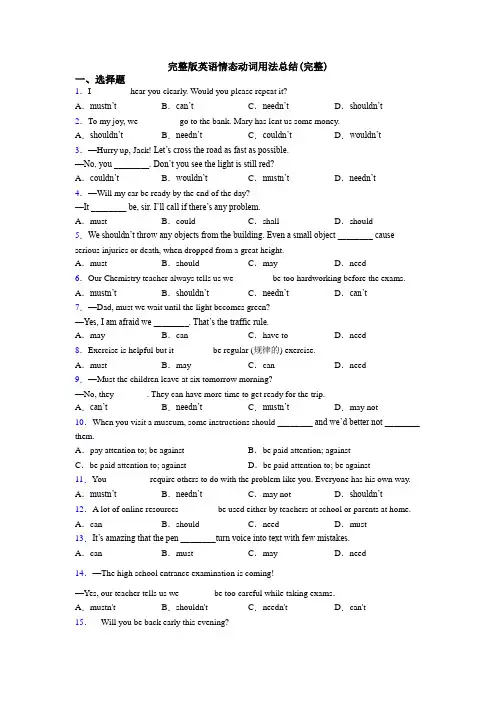
完整版英语情态动词用法总结(完整)一、选择题1.I ________ hear you clearly. Would you please repeat it?A.mustn’t B.can’t C.needn’t D.shouldn’t2.To my joy, we_________ go to the bank. Mary has lent us some money.A.shouldn’t B.needn’t C.couldn’t D.wouldn’t 3.—Hurry up, Jack! Let’s cross the road as fast as possible.—No, you ________. Don’t you see the light is still red?A.couldn’t B.wouldn’t C.mustn’t D.needn’t4.—Will my car be ready by the end of the day?—It ________ be, sir. I’ll call if there’s any problem.A.must B.could C.shall D.should5.We shouldn’t throw any objects from the building. Even a small object ________ cause serious injuries or death, when dropped from a great height.A.must B.should C.may D.need6.Our Chemistry teacher always tells us we ________ be too hardworking before the exams. A.mustn’t B.shouldn’t C.needn’t D.can’t7.—Dad, must we wait until the light becomes green?—Yes, I am afraid we ________. That’s the traffic rule.A.may B.can C.have to D.need 8.Exercise is helpful but it ________ be regular (规律的) exercise.A.must B.may C.can D.need9.—Must the children leave at six tomorrow morning?—No, they _______. They can have more time to get ready for the trip.A.can’t B.needn’t C.mustn’t D.may not 10.When you visit a museum, some instructions should ________ and we’d better not ________ them.A.pay attention to; be against B.be paid attention; againstC.be paid attention to; against D.be paid attention to; be against11.You ________ require others to do with the problem like you. Everyone has his own way. A.mustn’t B.needn’t C.may not D.shouldn’t12.A lot of online resources ________ be used either by teachers at school or parents at home. A.can B.should C.need D.must13.It’s amazing that the pen ________turn voice into text with few mistakes.A.can B.must C.may D.need14.—The high school entrance examination is coming!—Yes, our teacher tells us we _______ be too careful while taking exams.A.mustn't B.shouldn't C.needn't D.can't15.---Will you be back early this evening?---Yes, but I ________ be a little late. Our boss sometimes has extra work for us.A.may B.must C.need D.will16.You ______ pay too much attention to your pronunciation, as it is so important in the oral (口头的) test.A.shouldn’t B.mustn’t C.can’t D.needn’t17.My bike was broken yesterday,so I____walk home.A.might B.had to C.must D.could18.Think twice before making a decision, or you __________ get into trouble.A.may B.can't C.shouldn't D.mustn't 19.Don’t cross the road until the traffic lights turn green. A car_______hit you.A.need B.may C.should D.must 20.—Where is Tom? I am considering ________ him about the result of the exam.—Oh. You ________. He has known it already.A.to tell; can't B.telling; needn't C.tell; mustn't D.told; shouldn't 21.—The article says that a person’s anim al sign decides his personality.—You ________ read it for fun, but don’t believe in that.A.can B.must C.shouldn’t D.needn’t 22.According to the rule, used batteries ________ be dropped in the red bin for harmful wastes. A.may B.would C.should D.might23.You _________ smoke here! Look at the sign. It says "No smoking".A.needn't B.mustn't C.can D.may24.— Listen! Tom ________ be listening to the music while doing his homework.—Let’s go upstairs to remind him to turn it off.A.should B.could C.would D.must 25.—Suzy described every detail of the accident just now.—Her memory ________ be completely back.A.shall B.need C.must D.could26.Never throw objects from the building. Even a small object ________ cause serious injuries, or death, when dropped from a great height.A.must B.should C.may D.need27.—In China, many parents complain that their children have to stay up late to do the homework.—Don’t worry. The government has realized the problem. I’m sure there ________ be good news soon.A.can B.should C.need D.must28.—Will dad arrive home at 6 o’clock to have dinner with us this evening?— I think he will, but he ________ not. Sometimes he works extra hours.A.can B.must C.need D.may 29.—Mum, why do I have to wear a mask before entering the supermarket?—For your health and safety, you ________ be too careful.A.shouldn’t B.can’t C.mustn’t D.needn’t30.— The sandstorm in Beijing is so serious this year.— Yes, I wonder when we ________ worry about the air we breathe.A.can’t B.mustn’t C.needn’t D.shouldn’t31.A hard-working man ________ become a great scientist, but a great scientist ________ be a hard-working man.A.can’t; can B.may not; must C.can’t; must D.may not; can 32.—How beautiful the winter jasmines (迎春花) are!—Yes. These golden-yellow flowers ________ be widely seen in my city in March.A.must B.can C.would D.should33.— What do you think of the show yesterday?— Some of them were really good but others ________ be better.A.will B.must C.need D.can34.—In China, many students have to stay up late to do their homework.—No worries. The government has realized the problem. I’m sure there ________ be good news soon.A.can B.should C.must D.need 35.—Who’s singing next door? Is it Miss Wang?—It ________ be her. She’s having the board meeting.A.can’t B.shouldn’t C.mustn’t D.needn’t 36.Sorry, smoking is not allowed here. If you ________ , you will be fined according to the rules. A.can B.will C.may D.must37.—Is it really necessary for me to go shopping with a mask on?—I’m afraid you ________ in publ ic. It is not only to protect yourself but also to protect others. A.must B.should C.can D.need 38.—Could I join you in the programme?—Sorry, you ________. You are too young.A.shouldn’t B.mustn’t C.can’t D.needn’t 39.—Who is singing next door? It sounds like a young girl’s voice.—It _________ be Jane. But she seldom sings English songs.A.need B.must C.may D.can40.Look at the floor, Tom! ________ you watch TV while having a meal?A.Should B.Could C.Must D.May【参考答案】一、选择题1.B解析:B【详解】句意:我听不清你说什么。
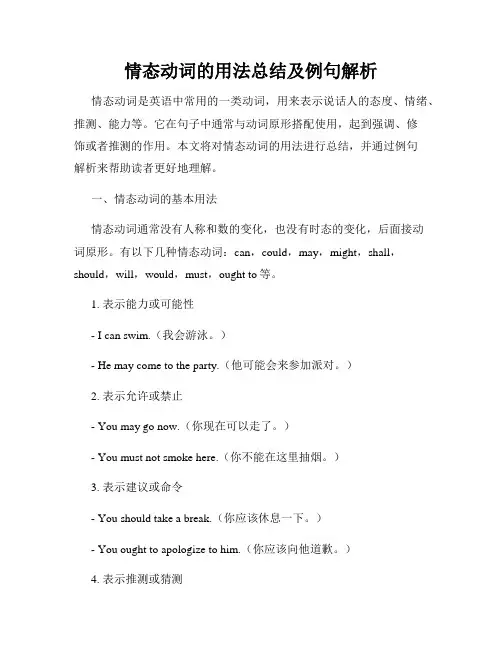
情态动词的用法总结及例句解析情态动词是英语中常用的一类动词,用来表示说话人的态度、情绪、推测、能力等。
它在句子中通常与动词原形搭配使用,起到强调、修饰或者推测的作用。
本文将对情态动词的用法进行总结,并通过例句解析来帮助读者更好地理解。
一、情态动词的基本用法情态动词通常没有人称和数的变化,也没有时态的变化,后面接动词原形。
有以下几种情态动词:can,could,may,might,shall,should,will,would,must,ought to等。
1. 表示能力或可能性- I can swim.(我会游泳。
)- He may come to the party.(他可能会来参加派对。
)2. 表示允许或禁止- You may go now.(你现在可以走了。
)- You must not smoke here.(你不能在这里抽烟。
)3. 表示建议或命令- You should take a break.(你应该休息一下。
)- You ought to apologize to him.(你应该向他道歉。
)4. 表示推测或猜测- He could be there.(他可能在那里。
)- It might rain tomorrow.(明天可能会下雨。
)5. 表示义务或必须- We must finish the project on time.(我们必须按时完成这个项目。
)- You ought to help him.(你应该帮助他。
)二、情态动词的细分用法除了以上的基本用法外,情态动词还有一些特殊的用法,需要注意其具体含义和用法。
1. can 和 could- 表示能力和技能:I can play the piano.(我会弹钢琴。
)- 表示请求或许可:Can I use your computer?(我可以用你的电脑吗?)- could 还可以用来表示过去的能力或许可:When I was young, I could run very fast.(小时候,我跑得很快。
情态动词的用法要点情态动词的基本用法1.Can could表示能力,允许和有把握的推断2.May, might表允许、祝愿,表推测语气轻如棉3.Must表必须、必要,表推测预期重如山4.Shall用于一三人称征求意见;用于二三人称表说话人的命令、允诺、威胁或警告也常见5.Should=ought to 表可能、建议、命令或劝告。
6.Will,would表意志、意愿和习惯;用于第二人称疑问句征求意见;用于二三人称表推测也常见。
7.Need,dare兼作实动和情动8.Need作情动,在疑问或否定中显神通9.Dare作情动,只“敢于”用在疑问、否定或条件句中10. Dare作实动,后接to句子才通11. 情态动词+完成时的用法12. 情态动词语气的强弱13. would和used to(do)的区别14. must和have to的区别15. 其它一.can和could特别说明:(1)could用来表示请求时,语气委婉,主要用于疑问句,不能用于肯定句,答语应用can(即:could不能用于现在时态的简略答语中)。
如:——Could I use your dictionary?——Yes, you can.(否定回答可用:No, I’m afraid not.)(2)can和be able to辨析can(could)和be able to都可以表示能力,意思上没有区别。
但can只有现在式和过去式,而be able to则有更多的形式。
如:I’ve always wanted to able to speak fluent English.Those bags look really heavy, are you sure you’ll be able to carry them on your own?但是,表示在过去某时的某一场合经过一番努力,终于做成了某事,通常不用could,而用was/were able to来表示。
英语情态动词的用法总结情态动词是英语中一类特殊的动词,用来表示说话者的态度、推测、可能性、能力、许可和义务等。
情态动词包括can、could、may、might、must、shall、should、will、would、ought to等。
下面是关于英语情态动词用法的总结。
1. 表示能力和可能性:- can/could:表示能力和可能性,用于表达某人有能力做某事或某事有可能发生。
例如:“I can swim.”(我会游泳),“She could come to the party.”(她可能会来参加派对)。
- may/might:表示可能性,用于表示某事有可能发生,程度较can/could稍弱。
例如:“It may rain tomorrow.”(明天可能会下雨),“He might win the competition.”(他有可能赢得比赛)。
2. 表示推测和猜测:- must:表示推测,用于表示某事几乎可以肯定或有极大的可能性。
例如:“He must be tired.”(他肯定累了),“She must have forgotten about the meeting.”(她肯定忘记了会议)。
- may/might:表示推测,用于表示某事有可能发生或存在。
例如:“She may be busy.”(她可能很忙),“They might not know the answer.”(他们可能不知道答案)。
3. 表示许可和建议:- can/could:表示许可,用于表示某事是被允许的。
例如:“Can I borrow your pen?”(我可以借你的笔吗?),“Could you open the window, please?”(请你能开窗户吗?)。
- may/might:表示许可,用于礼貌地请求或征求对方的意见。
例如:“May I ask you a question?”(我可以问你一个问题吗?),“Might I suggest an alternative?”(我可以提出一个替代方案吗?)。
情态动词的用法总结情态动词是一类特殊的助动词,用于表示说话者对动作、态度、能力、可能性、许可性、义务等方面的态度或感情色彩。
情态动词常见的有can/could, may/might, must,shall/should, will/would等。
一、情态动词的基本用法1.情态动词可以表示能力或可能性:- Can/could可用于表示能力上的可能性,may/might可用于表示推测、可能性和许可性。
- He can swim.(他会游泳。
)- She may be busy.(她可能忙。
)2.情态动词可以表示许可或请求:- Can/could可用于表示请求或许可。
- Can I use your phone?(我能用一下你的手机吗?)3.情态动词可以表示义务或建议:- Should用于表示建议或应该的义务。
- You should study hard.(你应该努力学习。
)4.情态动词可以表示推测或可能性:- Must用于表示推测的肯定性,may/might用于表示推测的可能性。
- He must be tired.(他一定累了。
)- They may come late.(他们可能会迟到。
)5.情态动词可以表示一种可能的结果:- Will/would用于表示推测或假设的结果。
- If it rains, we will stay indoors.(如果下雨了,我们就呆在室内。
)二、情态动词的注意事项1.情态动词没有人称和数的变化,后面直接跟动词原形。
- He can play the piano.(他会弹钢琴。
)2.情态动词后面的动词一般用原形,表示动作和状态。
- I can swim.(我会游泳。
)- They should apologize.(他们应该道歉。
)3.情态动词用于疑问句时,直接将情态动词置于句首。
- Can you swim?(你会游泳吗?)4.情态动词用于否定句时,直接在情态动词前加"not"。
英语情态动词用法总结(完整)一、单项选择情态动词1.—Where is my dictionary?I remember I put it here yesterday.—You___it in the wrong place.A.must put B.should have putC.might put D.might have put【答案】D【解析】【详解】考查情态动词。
句意:——我的词典在哪里?我记得昨天放在这里了。
——你或许放错了地方。
“might have +动词+ed形式”表示过去可能完成的动作。
根据所提供的情景Where is my dictionary? I remember I put it here yesterday.可判断出把词典放在某个地方发生在过去,所以要用“might have +动词+ed形式”。
“should have + 动词+ed形式”表示“(过去)本来应该做某事”。
must意为“一定”,是肯定的推测,与所提供的情景的矛盾。
might put表示现在发生的事。
故选D。
2.Using AI, many companies are now conducting experiments that__________ possible just a few years ago.A.would have been B.might have beenC.shouldn't have been D.couldn't have been【答案】D【解析】【详解】考查情态动词表推测。
句意:很多公司现在使用人工智能进行试验,这在几年前是不可能的。
根据“a few years ago”可知,此处表示“过去不可能”,应该用couldn’t have done,故D 项正确。
3.-- Did Jim come?-- I don’t know. He _______ while I was out.A.might have come B.might comeC.must have come D.should have come【答案】A【解析】【详解】考查情态动词推测用法。
英语情态动词用法总结(完整)一、单项选择情态动词1.--- Difficulties always go with me!--- Cheer up! If God closes door in front of you, there be a window opened for you. A.must B.wouldC.could D.can【答案】A【解析】【详解】考查情态动词辨析。
句意:——困难总是伴随着我!——高兴点! 如果上帝在你面前关上了门,一定有一扇窗户为你打开。
A. must必须;B. would将要;C. could能,会;D. can能,会。
must表示对现在的状态推测时,意为“一定”,表示可能性很大的推测。
符合语境。
故选A。
【点睛】1) must用在肯定句中表示较有把握的推测,意为"一定"。
2) must表对现在的状态或现在正发生的事情的推测时, must 后面通常接系动词be 的原形或行为动词的进行式。
3) must 表示对已发生的事情的推测时,must 要接完成式。
4) must表示对过去某时正发生的事情的推测,must 后面要接完成进行式。
5) 否定推测用can't。
本句中的。
must表示对现在的状态推测时,意为一定,表示可能性很大的推测。
符合第2点用法。
2.Paul did a great job in the speech contest. He many times last week.A.need have practised B.might practiseC.must have practised D.could practise【答案】C【解析】【详解】考查情态动词。
句意:保罗在演讲比赛中表现得很好。
他上星期一定练习了很多次。
must have done是对过去发生的动作最有把握的猜测,意思是“一定”。
故C选项正确。
3.He is a bad-tempered fellow, but he ________ be quite charming when he wishes.A.shall B.shouldC.can D.must【答案】C【解析】【详解】考查情态动词辨析。
句意:他是个脾气不好的家伙,但当他希望自己有魅力的时候,他可以变得相当可爱。
此处表示“能、可以”,故C项正确。
4.-- Turn off the TV, Jack. _______ your homework now?-- Mum, just ten more minutes, please.A.Will you be doing B.Should you be doingC.Shouldn't you be doing D.Couldn’t you be doing【答案】C【解析】【详解】考查含情态动词的进行时态。
句意:——把电视关掉,杰克。
你现在不应该做作业吗?——妈妈,请再给我十分钟。
此处表示目前应该在做某事,should“应该”,这里用含情态动词的进行时态,故选C。
5.—What happened to the young trees we planted last week?—The trees ________ well, but I didn’t water them.A.might grow B.needn’t have grownC.would have grown D.would grow【答案】C【解析】考查虚拟语气。
——我们上周种的小树怎么了?——这些小树本来会长得很好,但是我们没有给它们浇水。
根据语境可知,此处是对过去的事实进行假设,故本题选C。
6.Mark ______ have hurried. After driving at top speed, he arrived half an hour early. A.needn’t B.wouldn’t C.mustn’t D.couldn’t【答案】A【解析】考查情态动词。
need’t have done 本不必要做某事,句意:迈克本不必要着急的。
他以全速驾驶后,他早到了半个小时。
wouldn’t不会,mustn’t禁止,couldn’t不可能,所以选A。
7.Frankly speaking, I am not sure whether I ________ this in the old days with that kind of equipment, which looks quite odd and ridiculous.A.should have done B.need have done C.would have done D.must have done 【答案】C【解析】【详解】考查情态动词+have done。
句意:坦率地说,我不确定在过去我是否会用这种设备做这件事,这看起来很奇怪和可笑。
A. should have done表示本应该做某事,而实际上没有做某事;B. need have done表示本来需要做某事而没有做;C. would have done虚拟语气,表示对过去事情的假设,意思是“本来会做”;D. must have done表示对过去事情的肯定推测,译成“一定做过某事”。
由“in the old days”可知,本句表示对过去事情的假设。
故选C项。
8.No driving after drinking is a rule that every driver ____________ obey in our country. A.will B.shallC.may D.can【答案】B【解析】试题分析:考察情态动词。
A. 将要 B.将要 C.可能D.可以。
Will 表示请求、建议、意志、愿望和决心。
Shall用于第二、第三人称,表示说话人给对话的命令、警告、允诺或威胁。
May表示请求和允许;用于祈使句表示决心;表示推测、可能性。
Can表示能力;请求和允许。
句意:酒后驾车是每一位驾车者在我们国家应当遵守的规则。
故选B。
考点:考察情态动词9.—I feel a little nervous.—Take it easy. You __________ have difficulty passing the exam when you have prepared for it well.A.mustn’t B.needn’t C.may not D.shouldn’t【答案】D【解析】【详解】考查情态动词。
句意:——我觉得有点紧张。
——不要着急。
当你准备充分时,通过考试应该不会有困难。
A. mustn’t禁止,不允许;B. needn’t不必;C. may not可能不会;D. shouldn’t不应该。
结合句意可知答案为D。
10.We ________ take clean drinking water for granted. One day we may run out of it. A.needn't B.can'tC.won't D.shouldn't【答案】D【解析】【详解】考查情态动词。
句意:我们不应该把拥有洁净的饮用水看作是理所当然的。
也许有一天,我们会用完它。
shouldn't“不应该”,符合句意。
needn't不必;can't不可能;won't将不。
故选D。
11.---We want someone to design the new art museum for me.---_____ the young fellow have a try?A.Shall B.May C.Will D.Need【答案】A【解析】【详解】考查情态动词。
句意:——我们想找人为我设计一个新的艺术博物馆。
——是不是让这位年轻小伙子试一试?shall作为情态动词,用于二三人称,表示"询问","警告","允诺","命令","决心","强制"等语气。
will作为情态动词,用于主语是各种人称的陈述句中,表示"意愿"和"倾向"。
用于第二人称的疑问句中,表"请求"。
故选A。
12.I’m sorry, but you _____ go wrong. There’s no such man here.A.need B.can C.must D.will【答案】C【解析】【详解】考查情态动词。
句意:很抱歉,但是你一定是弄错了。
这儿没有这么个人。
A. need需要;B. can能够;C. must必须;D. will将会。
must指有把握的推测,“一定;必定”,结合下文There’s no such man here.可知一定是弄错了。
故选C。
13.—Where is my dictionary?I remember I put it here yesterday.—You___it in the wrong place.A.must put B.should have putC.might put D.might have put【答案】D【解析】【详解】考查情态动词。
句意:——我的词典在哪里?我记得昨天放在这里了。
——你或许放错了地方。
“might have +动词+ed形式”表示过去可能完成的动作。
根据所提供的情景Where is my dictionary? I remember I put it here yesterday.可判断出把词典放在某个地方发生在过去,所以要用“might have +动词+ed形式”。
“should have + 动词+ed形式”表示“(过去)本来应该做某事”。
must意为“一定”,是肯定的推测,与所提供的情景的矛盾。
might put表示现在发生的事。
故选D。
14.Keep up your spirits even if you _____ fail hundreds of times.A.must B.needC.may D.should【答案】C【解析】【详解】考查情态动词。
A. must必须;B. need需要;C. may可能,或许;D. should应该。
句意:即使失败了几百次,也要振作起来。
此处表示一种不确定的推测,故选C。
15.I ______ worry about my weekend—I always have my plans ready before it comes. A.can’t B.mustn’t C.daren’t D.needn’t【答案】D【解析】【详解】考查情态动词。